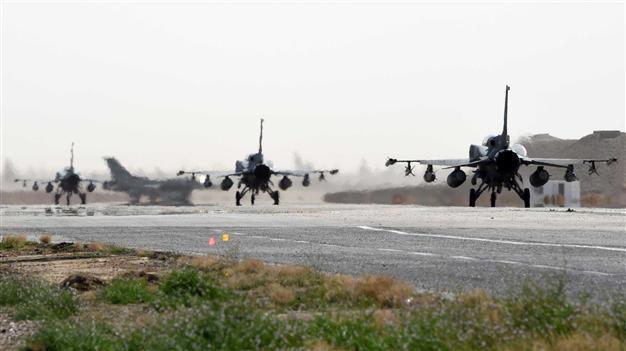UAE warplanes back in action against ISIL jihadists
DUBAI - Agence France-Presse

This photo released by WAM, the state news agency of the United Arab Emirates, shows Emirati F-16s at an air base in Jordan, Tuesday, Feb. 10, 2015. AP Photo
The United Arab Emirates on Feb. 10 launched air strikes from Jordan against the Islamic State of Iraq and the Levant (ISIL) as an important Arab ally in the US-led anti-ISIL coalition returned to combat operations.The raids came after President Bashar al-Assad said Damascus was being informed about air strikes against jihadists in Syria and that they could help his government if they were "more serious".
Emirati F-16s that flew in to Jordan on Sunday carried out raids against ISIL, "hitting their targets and returning safely to base", the UAE armed forces command said.
It did not specify how many aircraft were in action, or where or what their targets were.
Following the December crash and capture of Jordanian F-16 pilot Maaz al-Kassasbeh, the UAE withdrew from the coalition's strike missions over fears for the safety of its pilots.
The jihadists later killed the airman by burning him alive, releasing gruesome video footage of his "execution".
Abu Dhabi wanted more done in terms of search and rescue for downed pilots in the conflict zones, the New York Times reported, and the US military later deployed aircraft and troops to northern Iraq to boost its SAR capabilities.
On Tuesday, the Pentagon said coalition aircraft carried out one air strike in eastern Syria in the 24 hours to 0600 GMT, and also pounded the jihadists in Iraq with 11 strikes.
The US-led coalition launched air strikes against ISIL in Syria on September 23, but has pointedly refused to coordinate with Damascus.
In an interview broadcast by the BBC on Tuesday, Assad confirmed that there was no cooperation with the coalition, members of which he accused of backing "terrorism" -- in an apparent reference to their support for other rebel groups fighting to overthrow him.
"There's no direct cooperation" with the coalition, Assad said.
"Sometimes, they convey a message, a general message. There is no dialogue. There's, let's say, information, but not dialogue."
Assad said such communication was through third parties. "More than one party, Iraq and other countries," he said.
Damascus has grudgingly accepted the air strikes against ISIL on its territory, saying it was informed before they started, but has repeatedly criticised the coalition for failing to coordinate with it.
It says the raids cannot defeat ISIL unless the international community starts cooperating with Syrian troops on the ground.
Assad said the US-led strikes had the potential to help his government, but that so far they were not sufficiently "serious" to do so.
Analysts have said the anti-ISIL strikes have freed up Syria's government to focus on other rebel groups.
And Syrian opposition leaders have accused Washington of abandoning them by targeting the jihadists but not Assad's forces.
Rights groups have accused Syria's regime of indiscriminate bombardment of civilians in rebel-held areas, including with barrel bombs -- crude munitions packed with explosives and shrapnel that are generally dropped by helicopter.
But Assad flatly denied the allegation as a "childish story".
"I haven't heard of (the) army using barrels, or maybe cooking pots," he said, laughing.
"We have bombs, missiles and bullets.
"There are no indiscriminate weapons. When you shoot, you aim, and when you shoot, when you aim, you aim at terrorists in order to protect civilians," Assad said.
He also denied claims that the government had used chemical weapons in an August 2013 attack outside Damascus that killed up to 1,400 people.
"Who verified who threw that gas on who?" he asked.
Challenged on whether his government did so, he said "definitely not," adding that the reported death toll was "exaggerated".
Since Syria gave up its chemical arsenal in a Russian and US-brokered deal after the 2013 attack, there have been persistent reports of the use of chlorine gas.
But Assad said his forces were "definitely not" using chlorine as a weapon.
More than 210,000 people have been killed in Syria since the conflict began with anti-government protests in March 2011.
Two rounds of UN-sponsored talks have failed to achieve progress, but the UN's latest envoy on the conflict, Staffan De Mistura, was in Damascus on Tuesday to discuss his plan for a "freeze" of fighting in the main northern city of Aleppo.
















